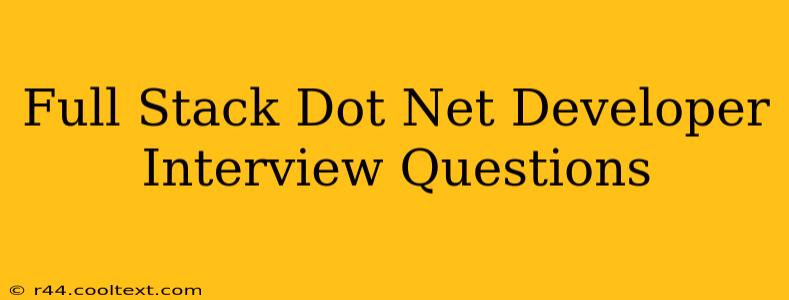Landing that dream .NET developer role requires meticulous preparation. This guide dives into the most frequently asked interview questions for full-stack .NET developers, covering both front-end and back-end technologies. We'll explore common questions, provide insightful answers, and offer strategies to impress your interviewer.
Essential .NET Back-End Interview Questions
This section focuses on the server-side aspects of .NET development. Expect questions probing your understanding of core frameworks, database interactions, and architectural patterns.
Core .NET Fundamentals
-
What is the difference between
IEnumerable<T>andIQueryable<T>? This question tests your understanding of LINQ. Explain thatIEnumerable<T>operates on in-memory collections, whileIQueryable<T>translates queries into database operations, optimizing performance for database interactions. Highlight scenarios where one is preferable over the other (e.g.,IQueryable<T>for large datasets). -
Explain the concept of Dependency Injection and its benefits. Discuss the principles of dependency inversion and how DI promotes loose coupling, testability, and maintainability. Mention popular DI containers like Autofac or Microsoft's built-in support.
-
Describe different types of HTTP requests (GET, POST, PUT, DELETE) and when you would use each. This is a fundamental question assessing your understanding of RESTful APIs. Clearly explain the purpose and typical use cases for each method, emphasizing the CRUD (Create, Read, Update, Delete) operations.
ASP.NET Core and Web API
-
How do you handle exceptions in ASP.NET Core Web API? Explain the use of
try-catchblocks, global exception handling middleware, and logging for robust error management. Mention different approaches to returning errors to the client (e.g., using custom error responses with appropriate HTTP status codes). -
Explain different approaches to authentication and authorization in ASP.NET Core. Discuss various methods like JWT (JSON Web Tokens), OAuth 2.0, and OpenID Connect. Explain how to secure your API endpoints and control access based on user roles and permissions.
Database Interactions
-
What are different database technologies you're familiar with, and what are their strengths and weaknesses? Mention your experience with SQL Server, PostgreSQL, MySQL, or other relevant databases. Compare their performance characteristics, scalability, and suitability for different applications.
-
Explain how you would optimize database queries for performance. Discuss techniques like indexing, query optimization using execution plans, and avoiding
SELECT *statements. Highlight your experience using profiling tools to identify performance bottlenecks.
Essential .NET Front-End Interview Questions
This section covers your front-end skills, essential for a full-stack developer. Expect questions about JavaScript, frameworks, and user interface design.
JavaScript and Frameworks
-
Explain the concept of closures in JavaScript and provide an example. Demonstrate your understanding of lexical scoping and how closures maintain access to variables from their surrounding functions, even after those functions have finished executing.
-
What are your experiences with JavaScript frameworks like React, Angular, or Vue.js? Detail your experience with at least one framework, highlighting your skills in component-based architecture, state management, and data binding. Be prepared to discuss specific projects and challenges overcome.
User Interface and User Experience (UI/UX)
-
How do you ensure your web applications are responsive and accessible? Discuss the importance of responsive design for various devices and screen sizes. Explain your knowledge of accessibility standards (WCAG) and how to implement them using CSS and ARIA attributes.
-
Describe your approach to designing and implementing user interfaces. Discuss your understanding of UI/UX principles, user research, wireframing, prototyping, and iterative development.
Advanced and Situational Questions
-
Describe a challenging technical problem you encountered and how you solved it. Prepare a compelling story demonstrating your problem-solving skills, analytical abilities, and perseverance. Focus on the process and lessons learned.
-
How do you stay up-to-date with the latest technologies and trends in .NET development? Mention your active participation in online communities, conferences, and self-learning initiatives. This demonstrates your commitment to continuous learning and professional development.
Preparing for Your Interview
Thorough preparation is key. Review your projects, refresh your knowledge of core concepts, and practice answering common interview questions. Focus on showcasing your skills, experience, and problem-solving abilities. Good luck!

